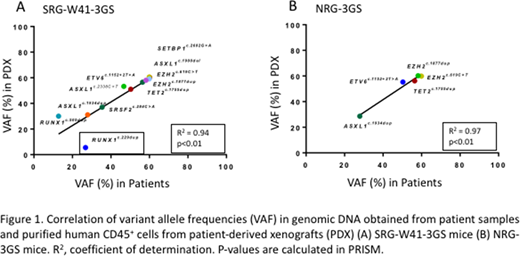Abstract
Myelodysplastic/myeloproliferative neoplasms (MDS/MPN) are complex clonal hematopoietic stem cell malignancies with overlapping dysplastic and proliferative features. Genomic analyses have charted the somatic mutation spectrum of MDS/MPN and revealed a major role for epigenetic dysregulation in their pathogenesis. No disease-modifying therapies are currently available, as progress has been hampered by a lack of genetically faithful in vivo model systems suitable for the preclinical development of new strategies. Yoshimi et al (Blood. 2017;130:397-407) recently showed that patients' chronic myelomonocytic leukemia (CMML) and juvenile myelomonocytic leukemia (JMML) cells transplanted into NOD/SCID-IL2Rγ-/-mice expressing human IL3, GM-CSF and SCF transgenes (NSG-3GS mice) produced xenografts that had mutations characteristic of the input cells. Since we had demonstrated a superior level of chimerism achieved from transplants of normal human CD34+cord blood cells in SirpaNOD/Rag1-/-/IL2rγc-/-/W41/41mice with c-KIT deficiency (with an otherwise mixed NOD-C57Bl/6 background - SRG-W41 mice) compared to conventional NSG or NRG hosts (Miller et al. Exp Hematol. 2017;48:41-49), it was of interest to explore their use as hosts of samples from patients with MDS/MPN: CMML, atypical chronic myeloid leukemia (aCML) and secondary acute myeloid leukemia (sAML) progressed from CMML or aCML.
Heparinized blood or bone marrow samples were obtained from patients treated at Huntsman Cancer Institute after informed consent. Diagnoses included CMML (n=5), aCML (n=2), and sAML (n=2). Unseparated cells were shipped by overnight courier to Vancouver and CD34+cells isolated on the same day were injected intravenously into sub-lethally irradiated female NRG mice or SRG-W41 mice, or in some cases the same sex and strains also carrying the human 3GS transgenes (NRG-3GS or SRG-W41-3GS mice) in accordance with British Columbia Cancer Agency institutional guidelines. Occasionally when mice were not immediately available, or large numbers of cells were available, cells were viably cryopreserved and transplanted later after thawing. Mice were observed for up to 36 weeks after xenotransplantation with .05 to 1.1x106 human CD34+cells. Engraftment of human CD45+cells in xenografts was evaluated by immunophenotyping, and a median of 90% human chimerism (range: 1% - 95%) was achieved at the time of bone marrow harvest from xenografts.
Variant allele frequencies (VAF) were determined in genomic DNA extracted from both the patient samples (CD34+cells) and matching fluorescence-activated cells (FACS)-sorted human CD45+cells (hCD45+cells) purified from xenografts (1-5 xenografts per patient sample). DNA samples were subjected to PCR amplification with extension primers and analyzed using a MALDI-TOF mass spectrometer (MassArray, Agena Bioscience, San Diego, CA). Each mutation call was assigned by the software based on the molecular weight of the extended primer. Analysis of hCD45+cells from eight xenograft samples so far demonstrated a strong correlation of VAF between the patient samples and hCD45+cells from xenografts, in both SRG-W41-3GS (R2=0.94, p<0.01) and NRG-3GS (R2=0.97, p<0.01) models (Figure 1). This tight correlation of VAF was illustrated in hCD45+cells from xenografts transplanted with CMML, aCML or sAML cells. The majority of mutations detected were those in epigenetic regulator genes, such as ASXL1, EZH2 and TET2. No significant difference in VAF was observed between CD34+and CD34- compartments within the hCD45+cells. Additional samples, including specimens from patients with the related myeloproliferative neoplasm, chronic neutrophilic leukemia (CNL) are being analyzed and will be presented.
These findings demonstrate the utility of SRG-W41-3GS as well as NRG-3GS as receptive hosts of primary human MDS/MPN cells with genetic evidence of their growth in these mice closely recapitulating the mutational profiles of the transplanted cells. These new strains may facilitate the development of functional screening and pre-clinical testing of novel therapeutic strategies for a range of human MDS/MPN and related myeloid disorders.
Deininger:Pfizer: Consultancy, Membership on an entity's Board of Directors or advisory committees; Blueprint: Consultancy.
Author notes
Asterisk with author names denotes non-ASH members.


This feature is available to Subscribers Only
Sign In or Create an Account Close Modal